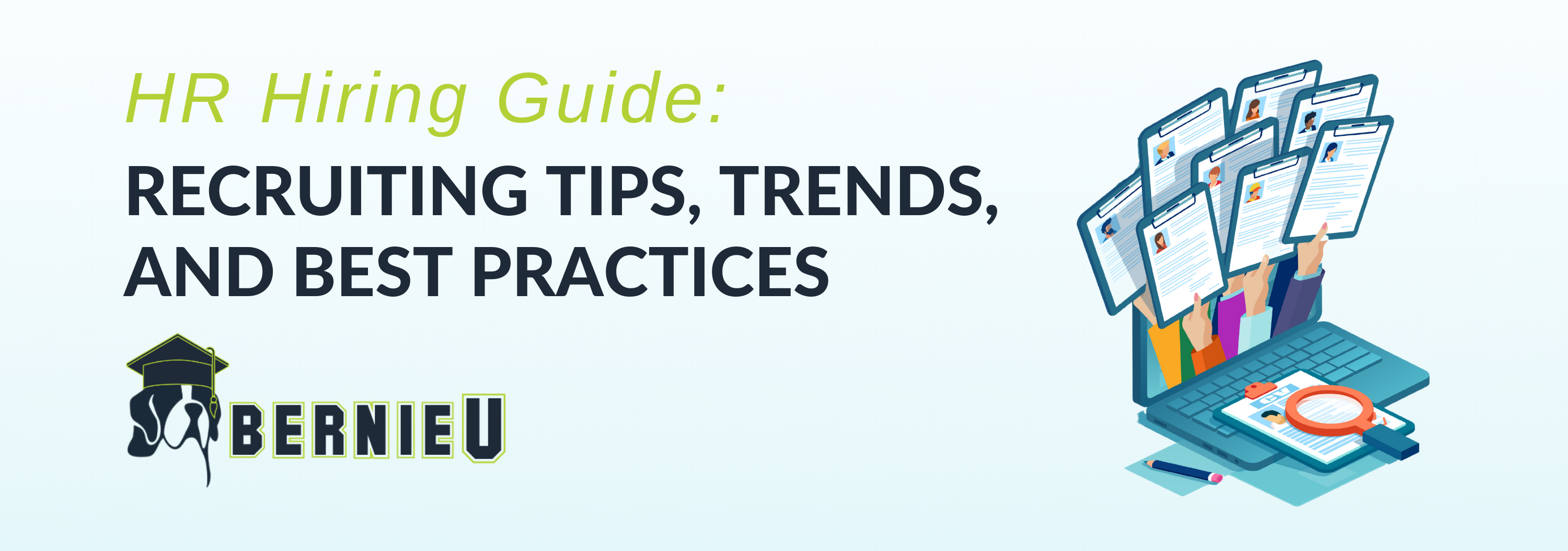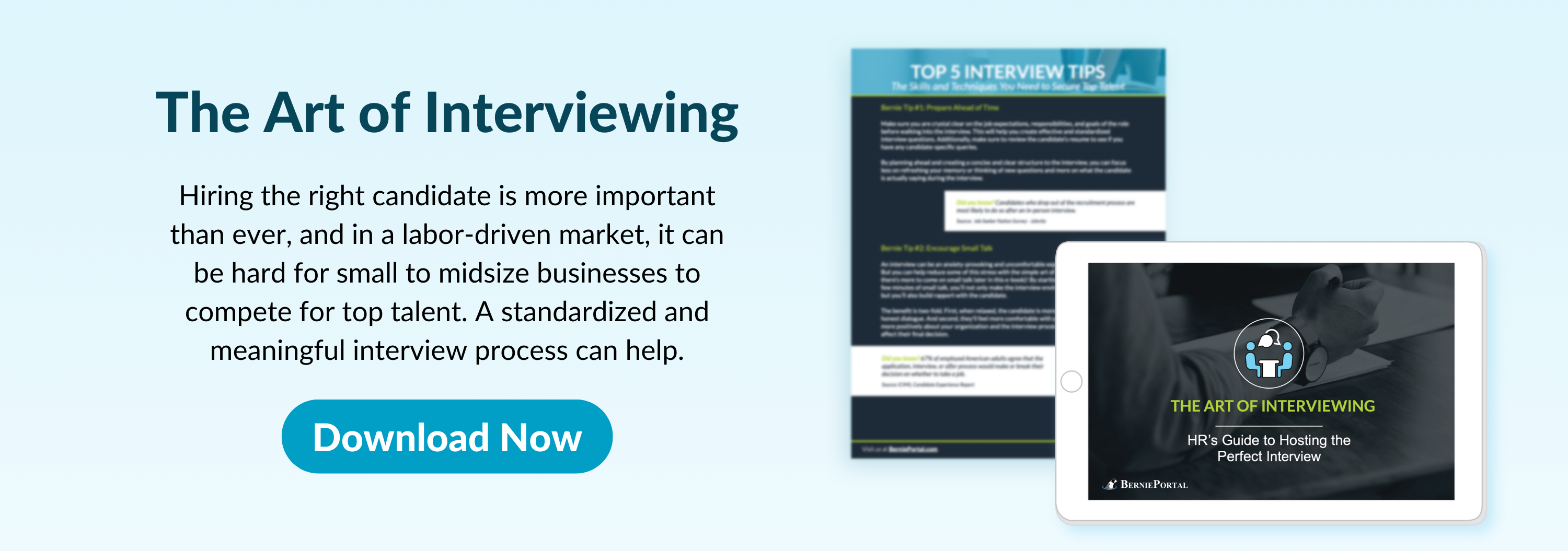Written by
Will Miranne
Will is an aPHR-certified writer on the marketing team at BerniePortal. He writes about healthcare, human resources, and benefits.
Should Employers Be Open-Minded to Resume Gaps?

Resume gaps have long been viewed as negatives in a person’s career journey and often cause difficulty during the hiring process. But these candidates often have a much more holistic story than simply time away from work. Employers may be surprised to find that these candidates offer new perspectives and strengths that should not be discounted.
Read on to learn more about the benefits of considering employees with resume gaps and how you can best approach the subject during the hiring process.
Excluding Candidates with Resume Gaps May Limit Talent Pools
Resume gaps are periods in a job candidate's work history where they were not employed. This can be for many reasons, and the circumstances will almost always be unique to the individual. So, while there are stigmas that resume gaps are red flags, there may be more to the story that paints that view as unfair. By excluding employees with resume gaps, organizations are effectively narrowing their talent pools and potentially missing out on valuable hires.
There are many valid reasons for resume gaps, such as taking time off to care for family members, pursuing further education, or dealing with personal health issues. In some cases, employees may have been laid off due to no fault of their own or taken time off for travel or to pursue other personal interests. Yet, these gaps are often viewed as unfavorable and can prevent otherwise qualified candidates from being considered for job opportunities.
The issue with pinpointing a reasonable cause for the gap is that many candidates may wish to keep that information private. Employers should consider the possibility that gaps are not as bad as they may seem, and candidates should be viewed more holistically.
The impact of excluding employees with resume gaps can be significant, and those with less traditional career paths may be unfairly excluded. This can result in a homogeneous workforce and limit the range of diversity of skills and perspectives within the organization.
Reno Perry, Founder at Wiseful, has this to say about resume gaps:
“We surveyed them all before we got started. "With all the layoffs, is it easier or harder to find qualified talent for your open jobs?" A majority (over 70%) said it was still a challenge finding candidates.
The takeaway? These companies need you. Plenty of them value what skills you bring to the table first and foremost. And they don’t care that you’ve been laid off or have a gap in your resume.”
It is becoming increasingly clear that the days of resume gaps being a hindering factor are coming to a swift close. By widening the pool of potential candidates to include those with resume gaps, organizations can tap into a wider range of skills, experiences, and backgrounds, resulting in a more well-rounded and diverse workforce. The more candidates you have to choose from, the more likely you will land a qualified candidate with a strong upside.
Benefits of Hiring Employees with Resume Gaps
There are many benefits to hiring employees with resume gaps. While these candidates may have taken time off from traditional employment, they often possess valuable skills learned during their time away.
Here are some of the benefits of hiring employees with resume gaps:
- Unique strengths and qualities: Employees with resume gaps may have developed unique strengths and qualities that can be an asset to any organization. For example, they may have gained valuable experience in areas such as caregiving, volunteer work, or pursuing further education, which can be applied to the workplace.
- Strong work ethic: Taking time off from traditional employment to care for family members or pursue personal interests often requires a strong work ethic and dedication. These qualities can translate well into the workplace and make employees with resume gaps valuable additions to any team.
- Adaptability: Employees with resume gaps often have experience adapting to changing situations and have had to be resourceful in finding ways to continue to grow and learn during their time away from work. This adaptability can make them excellent problem solvers and valuable contributors to any organization.
- Loyalty and commitment: Employees with resume gaps often value the opportunity to return to the workforce and are committed to maximizing their second chance. This can result in greater loyalty and commitment to their employer, making them valuable long-term additions to any organization.
Hiring employees with resume gaps can bring many skills, experiences, and perspectives to the workplace. Organizations can expand their talent pools and create more dynamic teams by being open to these candidates and recognizing their potential value.
What Questions To Ask Employees with Resume Gaps?
Employers must learn to ask the right questions when hiring an employee with a resume gap. While candidates may not always be open about their time away, most often, you will find that their circumstances may lead to a new perspective that could add value to your team.
Consider these questions when interviewing candidates with resume gaps:
- Can you tell me about the circumstances that led to the gap in your employment history?
- How did you spend your time during the gap in your employment?
- Did you engage in any professional development or training during this time?
- Did you take any steps to stay current in your field during the gap?
- Can you discuss any volunteer work or community involvement you engaged in during the gap?
- Did you take any time off for personal reasons during the gap in your employment?
- How have your experiences during this gap helped you grow or develop professionally?
- Are you concerned about how the gap in your employment might affect your ability to perform in this role?
- Please discuss any experiences or skills you developed during the gap that you feel are relevant to this role.
- Is there anything else you would like to share with me about the gap in your employment or your experience during that time?
How Organizations Remain Open to Employees with Resume Gaps
Employers should be more open to hiring candidates with resume gaps for several reasons.
It can broaden the talent pool and open up opportunities for highly skilled and qualified candidates who may have had a gap in their employment history for various reasons. By considering these candidates, employers can tap into a diverse range of skill sets and experiences that can be highly valuable for their organization.
Employers can benefit from the unique strengths and qualities that candidates with resume gaps can bring to the table. These candidates may have developed soft skills such as communication, empathy, and adaptability during their time away from work, which can be highly sought after in many roles. Additionally, these candidates may have gained experience in areas such as caregiving, volunteering, or further education, which can be relevant and beneficial to their job.
By being open to hiring candidates with resume gaps, employers can promote a culture of inclusivity and diversity. This can be highly attractive to potential candidates who may be seeking a workplace that values and supports individuals from all backgrounds and experiences. It can also have a positive impact on the company culture and morale, promoting an environment of respect and appreciation for all employees.
Hiring candidates with resume gaps can be a strategic decision for employers. It can provide an opportunity to access a broader range of candidates who may be more motivated and committed to their roles. These candidates may be seeking to return to the workforce after a period of time away and may be highly motivated to make the most of the opportunity. This can result in higher levels of productivity, job satisfaction, and loyalty, which can be beneficial for the organization in the long run.
Being open to hiring candidates with resume gaps can provide a range of benefits for employers. It can broaden the talent pool, provide access to unique skills and experiences, promote diversity and inclusivity, and result in higher levels of employee motivation and commitment. By recognizing the potential value of these candidates, employers can create a more dynamic and successful workforce.
Additional Resources
You can also stay informed, educated, and up-to-date with all things HR by using BerniePortal’s comprehensive resources:
-
BernieU—free online HR courses, approved for SHRM and HRCI recertification credit
-
BerniePortal Blog—a one-stop-shop for HR industry news
-
HR Glossary—featuring the most common HR terms, acronyms, and compliance
-
HR Guides—essential pillars covering an extensive list of comprehensive HR topics
-
HR Party of One—our popular YouTube series and podcast, covering emerging HR trends and enduring HR topics
Written by
Will Miranne
Will is an aPHR-certified writer on the marketing team at BerniePortal. He writes about healthcare, human resources, and benefits.
Related Posts
The first impression an employer makes is just as important (if not more important) than...
Organizations usually take one of four major approaches when talking about pay.
SHRM states that for HR, overlooking social media today would be like “ignoring e-mail 20...
Recruiting, acquiring, and keeping the right employees for your organization is the best...








Submit a Comment